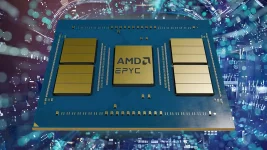Google Cloud recently added new virtual machines powered by AMD's 5th Generation EPYC processors. These C4D and H4D machines deliver strong performance for data analytics, web services, high-performance computing, and AI workloads. Testing shows the C4D instances achieve up to 80 percent higher throughput per virtual CPU compared to earlier versions, thanks to the advanced "Zen 5" architecture.
The H4D instances focus on high-performance computing with special Cloud RDMA technology that helps them work efficiently across thousands of processor cores. Dan McNamara, senior vice president at AMD, expressed excitement about bringing these processors to cloud services after their success with hardware partners and enterprise customers. Both virtual machine types are available for preview testing, with full release planned later this year across several global regions.
The EPYC 9005 "Turin" processor family includes 27 different models. Among them are the EPYC 9965, with 192 cores using "Zen 5C" architecture, the EPYC 9755, featuring 128 "Zen 5" cores, and the EPYC 9575F, which reaches 5 GHz speeds. AMD has significantly narrowed the performance gap with Intel's Xeon processors, creating strong competition in the server market that Intel dominated for many years.
The H4D instances focus on high-performance computing with special Cloud RDMA technology that helps them work efficiently across thousands of processor cores. Dan McNamara, senior vice president at AMD, expressed excitement about bringing these processors to cloud services after their success with hardware partners and enterprise customers. Both virtual machine types are available for preview testing, with full release planned later this year across several global regions.
The EPYC 9005 "Turin" processor family includes 27 different models. Among them are the EPYC 9965, with 192 cores using "Zen 5C" architecture, the EPYC 9755, featuring 128 "Zen 5" cores, and the EPYC 9575F, which reaches 5 GHz speeds. AMD has significantly narrowed the performance gap with Intel's Xeon processors, creating strong competition in the server market that Intel dominated for many years.












